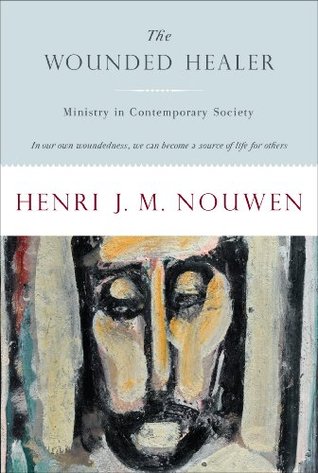More on this book
Community
Kindle Notes & Highlights
Started reading
March 2, 2018
“I will wait for you” goes beyond death and is the deepest expression of the fact that faith and hope may pass but that love will remain forever.
two men who reawaken in each other the deepest human intuition, that life is eternal and cannot
more, often find their ministers distant men who do not want to burn their fingers.
those who want to be for “everyone” find themselves often unable to be close to anyone.
no one can help anyone without becoming involved, without entering with his whole person into the painful situation, without taking the risk of becoming hurt, wounded or even destroyed in the process.
“Who can take away suffering without entering it?”
The great illusion of leadership is to think that man can be led out of the desert by someone who has never been there.
them. The remark “He really cares for us” is often illustrated by stories which show that forgetting the many for the one is a sign of true leadership.
when one has the courage to enter where life is experienced as most unique and most private, one touches
the soul of the community. The man who has
spent many hours trying to understand, feel, and clarify the alienation and confusion of one of his fellow men might well be the best equipped to speak to the needs of the many, because...
This highlight has been truncated due to consecutive passage length restrictions.
what is most personal and unique in each one of us is probably the very element which would, if it were shared or expressed, speak most deeply to others.
Faith in the value and meaning of life, even in the face of despair and death, is the second principle of Christian leadership.
Christian leadership is a dead-end street when nothing new is expected, when everything sounds familiar and when ministry has regressed to the level of routine.
for a man with a deep-rooted faith in the value and meaning of life, every experience holds a new promise, every encounter carries a new insight, and every event brings a new message.
not a leader because he announces a new idea and tries to convince others of its worth; he is a leader because he faces the world with eyes full of expectation, with the expertise to take away the veil that covers its hidden potential.
Underneath his coarse and bitter remarks, a Christian hears a cry for help in facing what is hidden behind his imminent death, and above all the cry for someone
who will be with him in life and in death.
deepest motivation for leading our fellow man to the future is hope.
For hope makes it possible to look beyond the fulfillment of urgent wishes and pressing desires and offers a vision beyond human suffering and even death. A Christian leader is a man of hope whose strength in the final analysis is based neither on self-confidence derived from his personality, nor on specific expectations for the future, but on a promise given to him.
Without this hope, we will never be able to see value and meaning in the encounter with a decaying human being and become personally concerned.
promises, not concrete successes, are the basis of Christian leadership.
Building a vocation on the expectations of concrete results, however conceived, is like building a house on sand instead of on solid rock, and even takes away the ability to accept successes as free gifts.
Hope prevents us from clinging to what we have and frees us to move away from the safe place and enter unknown and fearful territory.
Christian leadership is accomplished only through service. This service requires the willingness to enter into a situation, with all the human vulnerabilities a man has to share with his fellow man. This is a painful and self-denying experience, but an experience which can indeed lead man out of his prison of confusion and fear.
only by entering into communion with human suffering can relief be found.
he must bind his own wounds carefully in anticipation of the moment when he will be needed.
who must look after his own wounds but at the
same time be prepared to heal the wou...
This highlight has been truncated due to consecutive passage length restrictions.
he who proclaims liberation is called not only to care for his own wounds and the wounds of others, but also to make his wounds into a major source of his healing power.
The Christian way of life does not take away our loneliness; it protects and cherishes it as a precious gift.
we do everything possible to avoid the painful confrontation with our basic human loneliness,
invitation to transcend our limitations and look
beyond the boundaries of our existence.
reveals to us an inner emptiness that can be destructive when misunderstood, but filled with promise for him ...
This highlight has been truncated due to consecutive passage length restrictions.


